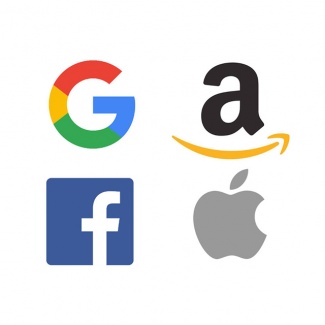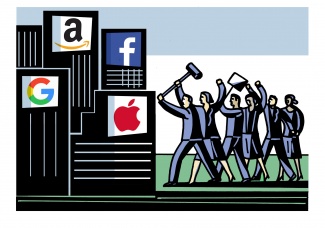The Big Four

The “Big Four” – also known as “The Four”[2], “GAFA”, or “The Four Horsemen” – is an acronym for Google (Alphabet), Apple, Facebook, and Amazon. These four have been separated from other big tech companies on the basis of one characteristic: their ability to influence political and societal change and consumer behavior through their oligopolization of the digital market. As former Google CEO Eric Schmidt has said, they “[drive] the consumer revolution in the minds of the consumer”[3], isolating them from other big tech companies like Microsoft and IBM. However, this immense power has so far gone without regulation, leaving the Big Four as de facto market regulators.[4] As their size and market dominance continues to grow, the international concern of the Big Four's ethical violation of antitrust laws continues to grow.
Contents
Who are "The Big Four"?
The Big Four has a combined market capitalization of almost $4.5 trillion USD.[5][6] While all four companies operate within the same general digital economy, each company specifically monopolizes an area of the digital market, making the competition overlap of the four companies with one another very little. This allows them to dominate their own individual market while creating an oligopoly of the general digital economy.
Run by parent company Alphabet, Google plays to the “head” or “brain” of human beings.[2] With monopolization of search and digital advertising, Google has caught itself in several lawsuits regarding their anti-competitive conduct and promotion of Google’s own products in search results over independent competitors. Despite $9 billion in fines, legal action has done little to influence Google’s business practices or market position.[7]
Apple
Apple plays on “procreation” by utilizing the common consumer behavior of making irrational decisions.[2] As the most profitable company in history, Apple’s profits are greater than the combined profits of Google, Facebook, and Amazon.[2]
Facebook plays to the “heart” by tapping into the human desire to love and be loved by others (mostly through the use of images and previous relationships that create empathy and expand an individual’s circle of love).[2] Facebook monopolizes social networking. According to mobile intelligence firm Apptopia, Facebook owns four of the top 10 most downloaded apps of 2020: WhatsApp, Instagram, Messenger, and Facebook.[8]
Amazon
As the leader in e-commerce with 50% of all online sales occurring through Amazon, the platform plays to the gut or “large intestine” of humans.[2][9] Individuals are biologically programmed to survive and believe the idea that less is bad and more is always better.[2] Their monopolization of e-commerce makes it near impossible for independent merchants to compete with the company.[5]
Ethical Concerns: Antitrust

As international governments struggle to regulate these multinational corporations, the Big Four face many antitrust allegations. Antitrust is legislation that prevents or controls trusts and other monopolies from dominating the market in efforts to promote competition in business.[11] By tax avoidance, privacy invasion, job destruction, and deregulation, the Big Four have become an oligopoly dominating the digital economy and online market.[2][12]
Anti-competitive Practices
GAFA has been accused of anti-competitive misconduct that has allowed them to dominate the market and deter potential competitors. Their increasing usage of big data and machine learning in business practices have allowed GAFA to lock in users and reinforce network effects.[13] In turn, this has deterred market entry as competitors fear GAFA’s market dominance or are bought-out by GAFA before they have the chance to become a real competitor.[13] Each company exhibits a "Winner-Take-All" business model that enables them to rise to the top of the market at the expense of their competitors.[2][13] This economic system has created an oligopoly where the Big Four already dominate the market, making it nearly impossible to dislodge them from their positions.[13]
International governments, such as the U.S. Congress and the European Union, struggle to regulate these multinational corporations. Officials launch investigations and file lawsuits against the Big Four in attempts to regulate their behavior and promote fair competition within the digital economy. However, the Big Four have become so large and powerful that legal consequences leave them unphased as they pay the large-sum fines and continue on with their anticompetitive practices.[7][14]
Big Data & Privacy Violation
Like much of big tech, GAFA utilizes its user’s data and private information to predict trends, sculpt user behavior, influence public perceptions, and financial profit from selling this data to third parties. As predicted by French theorist Jean-François Lyotard, the commercialization of knowledge causes shifts in how knowledge and information are valued and shapes social, political, and economic behaviors of society.[15][16] The Big Four are able to take user data, analyze it, and display it back to the individual in a manner that sculpts consumer perspective to align with corporate goals. Consumers see what GAFA wants them to see. Their utilization of intellectual property rights results in data manipulation that edges a digital divide between those (GAFA and big tech) who capitalize on data and the users who provide the data.[16][17]
However, some believe that because GAFA has designed the infrastructures and tools that make data usable, they hold the “moral right to profit from data”.[16] The analysis and use of data is architectured into the design and business process of these companies; without the use of data, they would be unable to operate.[18] The Big Four's software and hardware infrastructure are reliant on their ability to deliver specialized content and services to internet users.
References
- ↑ Cambaceres Avocat. "The GAFA: are they our best enemies?", 11 April 2019, https://cambaceres-avocats.com/en/the-gafa-are-they-our-best-enemies/
- ↑ 2.0 2.1 2.2 2.3 2.4 2.5 2.6 2.7 2.8 Galloway, Scott. The Four: The Hidden DNA of Amazon, Apple, Facebook, and Google, Random House, 3 October 2017
- ↑ The Wall Street Journal. "The New Online Wars", 8 June 2011, https://www.wsj.com/articles/SB10001424052702303657404576362861950356484
- ↑ Pasquale, Frank. "From territorial to functional sovereignty: The case of Amazon", Law and Political Economy, 6 December 2017, https://lpeproject.org/blog/from-territorial-to-functional-sovereignty-the-case-of-amazon/
- ↑ 5.0 5.1 King, Cecilia & McCave, David. "House Lawmakers Condemn Big Tech's 'Monopoly Power' and Urge Their Breakups", The New York Times, 6 October 2020, https://www.nytimes.com/2020/10/06/technology/congress-big-tech-monopoly-power.html
- ↑ Statista. "Market capitalization of selected U.S. tech and internet companies in 2006 and 2020", June 2020, https://www.statista.com/statistics/216657/market-capitalization-of-us-tech-and-internet-companies/
- ↑ 7.0 7.1 Schechner, Sam & Pop, Valentina. "Europe's Antitrust Push Against Google Hasn't Dented Its Heft. Can the U.S.?", The Wall Street Journal, 21 October 2020, https://www.wsj.com/articles/europes-antitrust-push-against-google-hasnt-dented-its-heft-can-the-u-s-11603293443
- ↑ Blacker, Adam. "Worldwide & US Download Leaders 2020", Apptopia, 7 January 2021, https://blog.apptopia.com/worldwide-us-download-leaders-2020
- ↑ Statistica. "Most popular online retail websites worldwide in 2020, by average monthly traffic", 2020, https://www.statista.com/statistics/274708/online-retail-and-auction-ranked-by-worldwide-audiences/
- ↑ McCabe, David. "America’s Top Foundations Bankroll Attack on Big Tech", 10 December 2019, https://www.nytimes.com/2019/12/10/technology/americas-top-foundations-bankroll-attack-on-big-tech.html
- ↑ Merrium-Webster. "Antitrust", n.d., https://www.merriam-webster.com/dictionary/antitrust
- ↑ Smyrnaios, Nikos. "L'effet GAFAM : stratégies et logiques de l'oligopole de l'internet", Communication & Languages, 2016, https://www.cairn.info/revue-communication-et-langages1-2016-2-page-61.htm
- ↑ 13.0 13.1 13.2 13.3 Barise, T.P. & Watkins, L. "The Evolution of Digital Dominance: How and Why We Got to GAFA", Digital Dominance, 2018
- ↑ Federal Trade Commission. "FTC Sues Facebook for Illegal Monopolization", 9 December 2020, https://www.ftc.gov/news-events/press-releases/2020/12/ftc-sues-facebook-illegal-monopolization
- ↑ Lyotard, Jean-François. The postmodern condition: A report on knowledge. (Translation from the French by Geoff Bennington & Brian Massumi), Biddles, 1979
- ↑ 16.0 16.1 16.2 Prainsack, Barbara. "Data Donation: How to Resist the iLeviathan", The Ethics of Medical Data Donation, 2019, https://www.ncbi.nlm.nih.gov/books/NBK554068/pdf/Bookshelf_NBK554068.pdf
- ↑ boyd, dana & Crawford, Kate. "Critical Questions for Big Data", 2012, https://www.tandfonline.com/doi/pdf/10.1080/1369118X.2012.678878
- ↑ Metcalf, J., Moss, E., & boyd, d. "Owning Ethics: Corporate Logics, Silicon Valley, and the Institutionalization of Ethics", Social Research: An International Quarterly, 2019, https://datasociety.net/wp-content/uploads/2019/09/Owning-Ethics-PDF-version-2.pdf